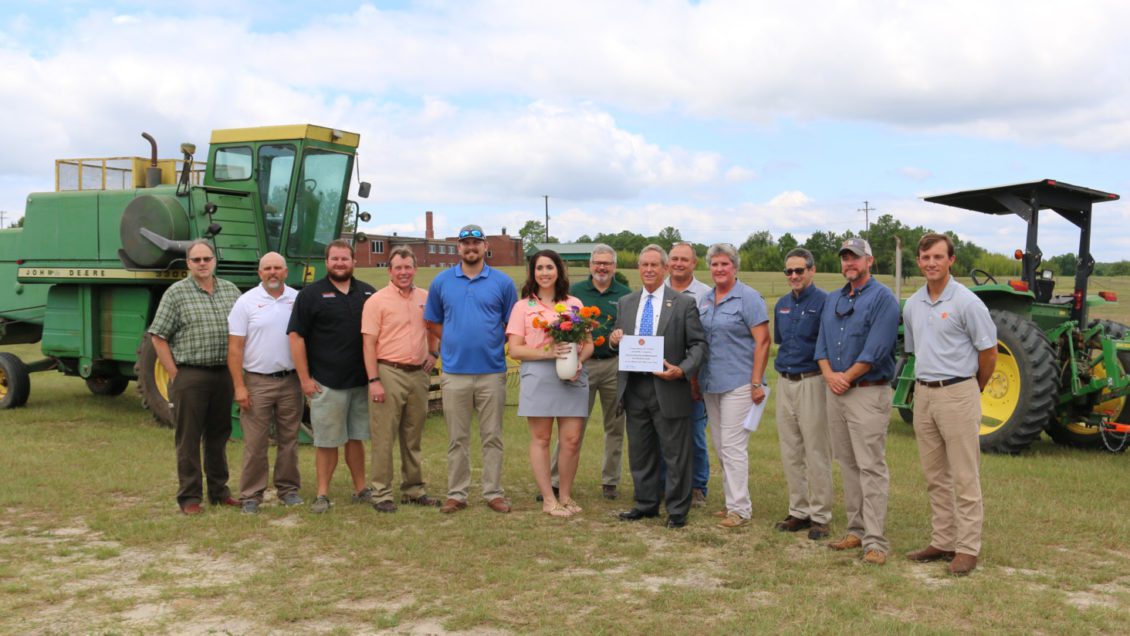Despite agribusiness today being the state’s biggest industry, farming wasn’t exactly at the top of the local economic food chain when Joe Wilson served in the South Carolina State Senate from 1985-2001.

But that doesn’t mean he wasn’t keenly aware of its importance, the now-U.S. Congressman said during a recent tour of Clemson University’s Sandhill Research and Education Center (SHREC) near Columbia.
“The irony is when I was in State Senate, there was not a single farm in my district,” Wilson said, “but I was always a supporter of the Clemson Extension Service and South Carolina Farm Bureau and agriculture in general — because I knew that the people I represented in Lexington eat.”
As part of his annual bus tour of South Carolina’s District 2, Wilson visited SHREC on Aug. 28 to meet with agricultural producers, constituents and representatives of S.C. Farm Bureau. One of six Clemson University Research and Education Centers around the state, SHREC was established in 1926 for agricultural research in the primarily rural Columbia area. As the Columbia community has grown, its focus has evolved to meet the changing needs of the state.
During his visit, Wilson heard updates from faculty members Cory Heaton, Adam Kantrovich and Nathan Smith on the research and agribusiness programming taking places at the facility and from farm manager Cody Bishop on its farm incubator program, which provides small plots for startup farmers to begin growing their businesses.
Not that the benefits of Clemson’s agricultural research came as news to Wilson, who said he’s been involved with the Clemson Cooperative Extension Service “virtually all (his) life.”

“I was really grateful to work with the Extension Service with (former agent) Raymond Boozer in Lexington County working on economic development. So, I know that the Extension service has been instrumental for a lot of the agricultural success in South Carolina,” he said. “And the Sandhill facility, I’m so glad to see it coming back to life. (Director) Kathy Coleman has been a longtime friend, and it’s been great to see her efforts and the innovations that are happening here.”
One tidbit Wilson gleaned that he said he plans to use to promote South Carolina agriculture on a grander stage is, to this day, a significant portion of the peaches grown commercially in the U.S. are derived from root stock that Clemson developed at SHREC.
“To find out that the peach crops of South Carolina had their origination of stock here and how incredible that is — because we know that South Carolina produces more peaches than another state next door called Georgia,” he said. “But I do have to acknowledge that there is another state on the West Coast called California that might be number one, but the jobs created, the opportunities created — and in Lexington County, the row crops are so important.”
With about 4.8 million acres of farming operations within its borders, agriculture’s importance to South Carolina is plain to see. But with a $41.7 billion impact on the economy also making it the state’s largest industry, agribusiness is also big business in the Palmetto State.
For Charles Wingard, Lexington County Farm Bureau member and vice president of field operations for W.P. Rawl, Wilson’s Midlands visit was meaningful in providing an opportunity for the congressman to come home, tour the district he represents and bring valuable information back to Washington.

“We really appreciate him taking the time to stop in at this research station at Sandhill and visit with ag producers and ag researchers to learn what’s going on in agriculture and where we might need a little help and what we’re going to do,” Wingard said.
And when it comes to the future of farming, Wingard said the research that takes place at SHREC and Clemson University’s other facilities across the state helps ensure its producers remain competitive while providing cutting-edge research to improve their sustainability and profitability.
“Clemson Extension is set up to transfer knowledge as well as any system I’ve ever seen,” he said. “For the producer, if I have a problem, I call my Extension agent. If he can’t solve it, then he calls a researcher and we’ll move the problem into a research setting such as Sandhill REC. They’ll find solutions and they’ll move two or three or four solutions back to a commercial setting and, then if it’s successful there, they’ll have a field day and invite different producers of that commodity who are having that problem to come see what the solutions to the problem are.”
Wingard also noted that Clemson’s agricultural research wasn’t limited simply to row crops or vegetable farming, but also included dairy, poultry and more — making Clemson Extension a veritable one-stop shop for solutions for the state’s farmers.
“All the research stations have different focuses … but they are all very important because as a commercial agricultural producer, we’re going to run into problems,” he said, “and Clemson — along with other land-grant institutions in this country — has a great track record of helping us solve our problems.”
Get in touch and we will connect you with the author or another expert.
Or email us at news@clemson.edu

